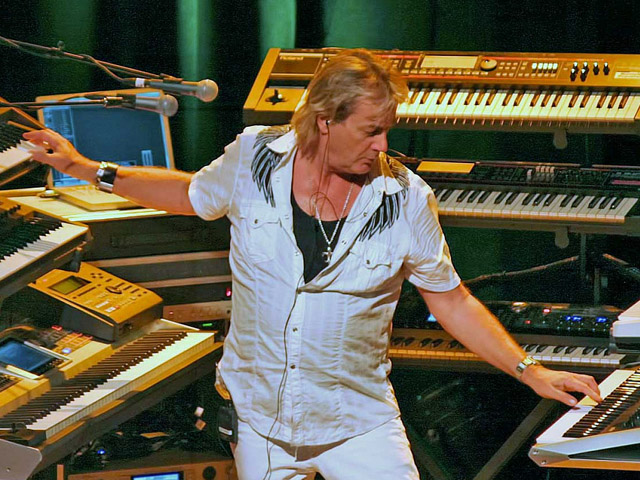HIT CHANNEL EXCLUSIVE INTERVIEW: January 2016. We had the tremendous honour to talk with an extremely talented person: Geoff Downes. He is best known as the keyboardist of Yes and Asia. Also, he co-founded The Buggles and worked with Mike Oldfield, Glenn Hughes, Chris Braide, GTR and others. Recently, he released “Ride the Tiger” album, a collaboration with Greg Lake (ELP, King Crimson). Read below the very interesting things he told us:
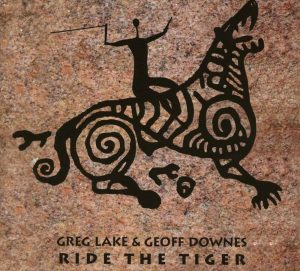 Why you decided to release “Ride the Tiger” album now?
Why you decided to release “Ride the Tiger” album now?
Well, I think this has been sitting on the shelf for years and a lot of people were asking about what happened to the tapes and stuff like that. We did a lot of thinking and we thought that the decision to release it is correct and it’s a nice time to see the record released.
Did you spend a lot of time working on “Ride the Tiger” album?
Yes, we did. I think we spent the best part of about six to eight months putting the ideas together. We were working together a lot in the same studio on the songs that really came out. I met Greg back in 1983 when we did the “Asia in Asia” show in Japan and we talked about doing something together at some point. So, in 1989-1990 we got together and we started working on the material. It never really came too much at the time but we were happy with the material and it’s nice that it finally saw the light of the day.
“Suburban Ghosts” is the second album of Downes Braide Association (DBA). Are there any differences between “Suburban Ghosts” and “Pictures of You” (2012) as far as songwriting or production?
I think the second DBA album was pretty much conceived in the same way as it did the first one. I think we did the first one in 2011 and I got on well with Chris together and we thought about doing another album. I think we approached it very much in the same way. Chris spent probably more time than I did, but certainly we spent a lot time to finish all this stuff together.
What are the current projects you are involved with?
I’ ve been involved with a lot of things at the moment. We will tour with Yes this year in April, May and June in Europe. I’m in the process of writing another Asia album with John Wetton (vocals, bass). So, I get involved with Yes in the first half of the year, and I think we can get some more touring with Asia in the second half of the year.
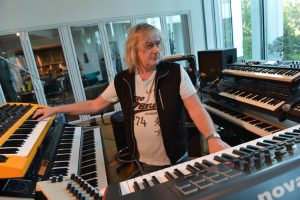 How is John Wetton’s health now (he has stomach cancer and undergoes chemotherapy)?
How is John Wetton’s health now (he has stomach cancer and undergoes chemotherapy)?
I think he had quite an extensive treatment for cancer. He is holding up very well and I think slowly-slowly he is getting back to his health. He is openly optimistic that he will get back on track. I work with John for a long time and we want to do another record together and I hope we will keep on doing this as long as we can.
Did you have a good time during the Cruise to Edge 2015?
We have done three until now and I think I enjoyed that one more than anyone else. Obviously, we were very saddened by Chris Squire’s (Yes –bass) passing last year. I think in terms of the actual cruise itself, it was the best so far. The fans and the other artists were great and obviously we missed Chris very much. He is no longer with us.
Can you tell us a few words about Chris Squire who passed away some months ago?
Obviously, we are all very, very saddened by Chris’ passing. He was such a great man and not just a musician. He had an enormous influence as a bass player to a whole generation of other musicians. I knew him very well personally especially in the last 4-5 years since I rejoined the band and in this band he had a great influence and we were very, very saddened by the news of his passing, although we knew about his illness for a while.
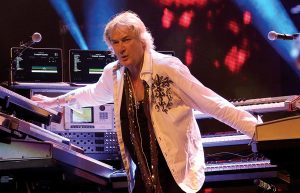 What’s your opinion today about Yes’ “Drama” album (1980)?
What’s your opinion today about Yes’ “Drama” album (1980)?
I think “Drama” is a great album and this year will come and play that (ed: on tour). I was very proud of that album and I am still very happy with the material. It may not be what the Yes fans expected at the time but since then many, many fans enjoy “Drama” as much as the other Yes albums.
Did you expect the huge commercial success of the “Video Killed the Radio Star” (1979) single by The Buggles?
I think that was the first thing that put Trevor (ed: Horn) and me on the map. We were truly confident that it was a good song and hopefully that could lead to a commercial success. But of course you never know that at that moment. We knew that we had a strong idea, a strong concept and of course it was a success and we were very happy about that, honestly. I think it’s a very deep song. People think it’s a just a pop song, but there are a lot of musical ideas and the story about the radio was really intriguing. It was a very strong song.
Is it flattering that “Video Killed the Radio Star” is the first music video shown on MTV on 1 August 1981?
I think it’s a nice milestone to have in your career. By the time, it had been in the charts and out of the charts and we couldn’t guess that it could go any further. Someone called me one day and said: “Your song was used as the first video on this new channel”. At the time, nobody knew how huge the MTV would be. It was just starting up.
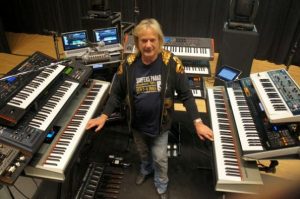 Had you ever played on Hans Zimmer’s Moog shown on “Video Killed the Radio Star” video, previously owned by Christopher Franke of Tangerine Dream?
Had you ever played on Hans Zimmer’s Moog shown on “Video Killed the Radio Star” video, previously owned by Christopher Franke of Tangerine Dream?
Yes, it is Hans’ Moog on the video for “Video Killed the Radio Star”. He did a lot of programming and synthesizing and things like that. It is only shown on the video. We never actually used that on the video. Yes, I used to play with one of Hans’ big synthesizers. I think he still has it. The original Chris Franke big modular system, yeah.
You co-produced “Smoke on the Water” for the Rock Aid Armenia project in 1989. What was it like to be in the studio with David Gilmour, Ritchie Blackmore, Brian May, Tony Iommi, Bruce Dickinson and others?
It was pretty amazing, you know. We had a lot of probably the best guitarists in the world. It was interesting to co-produce something like that in terms that there aren’t so many keyboards in that. The keyboard parts were played by Keith Emerson and me. It was interesting to see the different styles of the guitarists. All of them are very gifted and it was very enjoyable to work with them.
Do you have happy memories of your collaboration with Mike Oldfield on his “Islands” album (1987)?
Yes, it was very interesting actually to be in the same studio with Mike Oldfield, although we work in a different way. I was very impressed with the way he has such an ability with recording techniques. It was very educational in some respect. We got on very well and I had a good time with him.
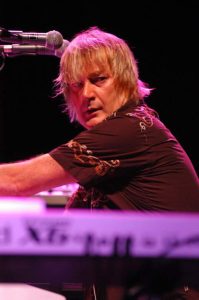 Do you think the ‘80s was a good decade for music?
Do you think the ‘80s was a good decade for music?
I think it was one of the best. I mean, the 70’s is fantastic. There were so many great groups in the ‘70s. But I think the ‘80s in certain fields of music was pioneering. In terms of my instrument -the keyboards- there was a lot of development during that period, that it didn’t really go any further ever since. In the ‘80s there wasn’t so much guitar, but it was a pioneering period in music.
Is it a coincidence that you prefer working with bass players (John Wetton, Greg Lake, Chris Squire, Glenn Hughes, Trevor Horn)?
Yeah, I think it’s a privilege that I have been managing to work with bass players from probably the four biggest progressive rock bands in the world: with Glenn Hughes from Deep Purple, John Wetton from King Crimson, Greg Lake from Emerson, Lake & Palmer and of course I worked for years with Chris Squire from Yes. I was very fortunate to work with such a bass player. I think that my style of keyboard playing fits very well with the bass players. I got on well with the bass players because I understand the influence that the bass has on music. It is a very powerful instrument in that respect.
Do you think playing with different people is a form of evolution too?
Yes, I think it’s healthy. I think the more people you work with, the more you get other influences. And if get other influences, hopefully you will see a development. You can bring more ideas on board if you have worked with different people.
I know you have been influenced by Dave Sinclair (Caravan – keyboards) among others. Which is your favourite Caravan album and why?
I think “In the Land of Grey and Pink” (1971) certainly is the album features Dave Sinclair’s most extensive playing on keyboards. I was influenced by that and the first period of progressive rock. It was really a developing period in music. “Nine Feet Underground” is a brilliant piece of music. The actual organ solo which lasts for about 5 minutes, is so well-constructed. That is the favourite Caravan album for me.
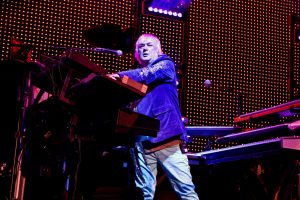 Have you ever turned down an interesting work offer because you were busy or for any other reason?
Have you ever turned down an interesting work offer because you were busy or for any other reason?
I was asked to join Foreigner back in time but I just formed Asia at the time. I couldn’t join them because there was another band on the way.
Were you shocked by David Bowie’s death? Had you ever met him?
No, I never actually met David Bowie and I’m sad that I didn’t, because he had such a huge influence on a lot of people. Maybe not so much on me, because I have been influenced by keyboard-driven bands like Procol Harum and bands like that. I really wanted to play the keyboards like they did. But having said that, the experimentation that David Bowie came up with wasn’t expected. He continued re-inventing himself and still remaining very, very true. No-one can say that David Bowie wasn’t cool. He always came up with different ideas.
A huge “THANK YOU” to Mr Geoff Downes for his time and to Billy James for his valuable help.
Official Geoff Downes website: http://geoffdownes.com
Official Geoffrey Downes Facebook page: https://web.facebook.com/Geoffrey.Downes.Official


